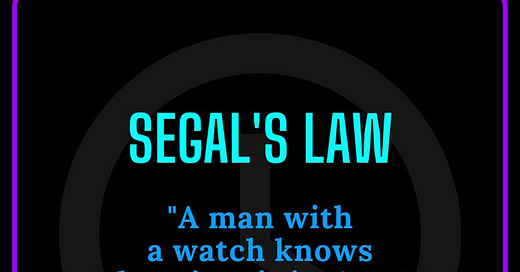Segal's Law
This metaphorical expression captures the essence of a modern-day conundrum: the dilemma of over-reliance on technology and the paradox of choice in decision-making.
In an era where information is abundant and technology is ubiquitous, Segal's Law serves as a reminder of the significance of simplicity and the necessity of critical thinking in navigating the sea of data and technological tools. Here we aim to delve into the depths of this law, explore how technological overload leads to indecision, the inherent value of simplicity in decision-making, and the irreplaceable role of critical thinking over sheer dependence on technology.
The Paradox of Choice: Technology and Indecision
Segal's Law vividly illustrates the predicament of decision-making in the face of technological overload.
Barry Schwartz's concept of the paradox of choice provides a concrete example of this issue. Schwartz posits that an overabundance of choices, rather than liberating, often leads to anxiety, indecision, and dissatisfaction. This aligns perfectly with the essence of Segal's Law, which suggests that an array of technological solutions or information sources can overwhelm rather than clarify. While it's tempting to believe that more data invariably lead to more accurate and informed decisions, this is not always the case.
The rebuttal to this argument lies in the understanding that while additional data can be beneficial, it is crucial to balance the sheer volume of information with the ability to interpret and act on it effectively. In decision-making, the quality of information often trumps quantity, underscoring the need for discernment in the age of information overload.
Simplicity in Decision-Making: The KISS Principle
Moving beyond the complications of technological overload, Segal's Law emphasizes the value of simplicity in decision-making.
The KISS principle – "Keep It Simple, Stupid" – echoes this effectiveness of simplicity in problem-solving. Simplicity leads to more efficient decision-making. A simple approach, at least initially, can prevent the unnecessary complications and indecision that too many options or overly complex systems can bring. Hence, Segal's Law, along with the KISS principle, advocates for a more measured approach to decision-making, valuing simplicity as a guiding principle.
Critical Thinking vs. Technological Dependence
The third pillar supporting the essence of Segal's Law is the importance of thinking over blind dependence on technology.
The rise of misinformation in the digital age serves as a stark reminder of the limitations of technology. Just as having two watches leads to uncertainty, relying solely on technology without critical analysis can lead to misinformation or erroneous conclusions.
This point is particularly poignant in an era where artificial intelligence and data analytics are often seen as panaceas for all decision-making challenges. While these technologies can significantly enhance understanding and decision-making, they are only tools designed to aid human judgment. They cannot replace the nuanced understanding, ethical considerations, and contextual awareness that human cognition brings to the table. Consequently, critical thinking remains an indispensable skill in the digital age, acting as a bulwark against the blind acceptance of technological outputs.
Balancing Technology with Human Judgment
While Segal's Law and the arguments presented advocate for simplicity and critical thinking, it's important to acknowledge the undeniable benefits of technology and data in enhancing human capabilities.
Advanced technologies, when used judiciously, can process vast amounts of data, uncover patterns invisible to the human eye, and provide insights that might otherwise be unattainable. Therefore, dismissing technological advancements and data analytics outright would be an oversight.
However, this perspective reinforces rather than contradicts the core thesis of this discussion. It highlights the need for a balanced approach where technology is used as a complement to, not a replacement for, human judgment and critical thinking. In essence, technology should be employed as a tool to augment human capabilities, not overshadow them.
Embracing the Wisdom of Segal's Law
Segal's Law reminds us that while technology and multiple information sources are invaluable, they can lead to over-complication and indecision. The discussion underscores the importance of embracing the benefits of technology while not losing sight of the value of simplicity and the irreplaceable role of critical thinking.
In an era where technology is often seen as a panacea, Segal's Law provides a necessary counterbalance. Advocating for a more thoughtful, measured approach to decision-making, it reminds us that in the quest for knowledge and efficiency, more isn't always better.
The fusion of technology with human insight, coupled with an appreciation for simplicity, can lead to more effective decisions. This post, therefore, serves as a call to embrace the wisdom of Segal's Law in our daily lives, recognizing that in simplicity and critical thinking lies the key to navigating the complexity of modern life.




